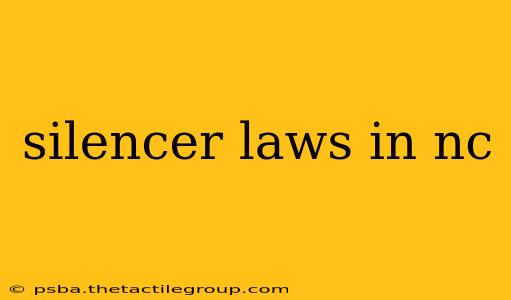North Carolina's laws regarding firearm silencers, often called suppressors, can be complex. This guide aims to provide a clear and comprehensive understanding of the current regulations, ensuring you're well-informed about the legal landscape. Disclaimer: This information is for educational purposes only and should not be considered legal advice. Always consult with legal counsel for specific guidance on firearm regulations.
What are the Legal Requirements for Owning a Silencer in North Carolina?
North Carolina regulates silencers under both federal and state laws. Federally, the process involves a Bureau of Alcohol, Tobacco, Firearms and Explosives (ATF) background check and registration. This means that purchasing a silencer involves a thorough background check, similar to purchasing a firearm. The ATF maintains a registry of all registered silencers.
State-level regulations in North Carolina largely mirror the federal requirements. There aren't any additional state-specific permits or licenses required beyond what's mandated at the federal level. This means that complying with federal regulations is sufficient for legal ownership in North Carolina.
The ATF's Role in Silencer Regulation
The ATF plays a critical role in regulating silencers nationwide, including in North Carolina. Their involvement includes:
- Background Checks: All purchasers must pass a thorough background check through the National Instant Criminal Background Check System (NICS).
- Registration: All silencers must be registered with the ATF. This registration process is part of the purchase and transfer process.
- Transfer Restrictions: Transferring ownership of a registered silencer involves additional steps and paperwork with the ATF. This isn't a simple private sale process.
Common Misconceptions about Silencers in NC
Several misconceptions surround silencers in North Carolina. Let's clarify some of them:
- Myth: Silencers make firearms completely silent. Reality: Silencers significantly reduce the sound of a firearm, but they don't eliminate it entirely. The sound is still considerable and could still cause hearing damage without proper hearing protection.
- Myth: Silencers are only for illegal activities. Reality: Silencers have legitimate uses, including hunting, sport shooting, and hearing protection. Many responsible firearm owners use silencers to mitigate noise pollution and protect their hearing.
- Myth: Silencers are easily obtainable. Reality: The ATF's rigorous background check and registration process makes obtaining a silencer a more involved process than purchasing a standard firearm.
Staying Informed About Changes in North Carolina Silencer Laws
Firearm laws, including those regarding silencers, can change. Staying updated is crucial. You can do this by:
- Monitoring the North Carolina General Assembly website: This provides access to legislative updates and proposed changes to state laws.
- Checking the ATF website: This federal agency frequently updates its guidance on regulations and procedures.
- Consulting with legal professionals specializing in firearm law: They can provide the most current and accurate information.
This guide provides a general overview of silencer laws in North Carolina. Remember, this is not a substitute for professional legal advice. Always consult a qualified legal professional for advice specific to your situation. Accurate and up-to-date information is paramount when dealing with firearm regulations.

